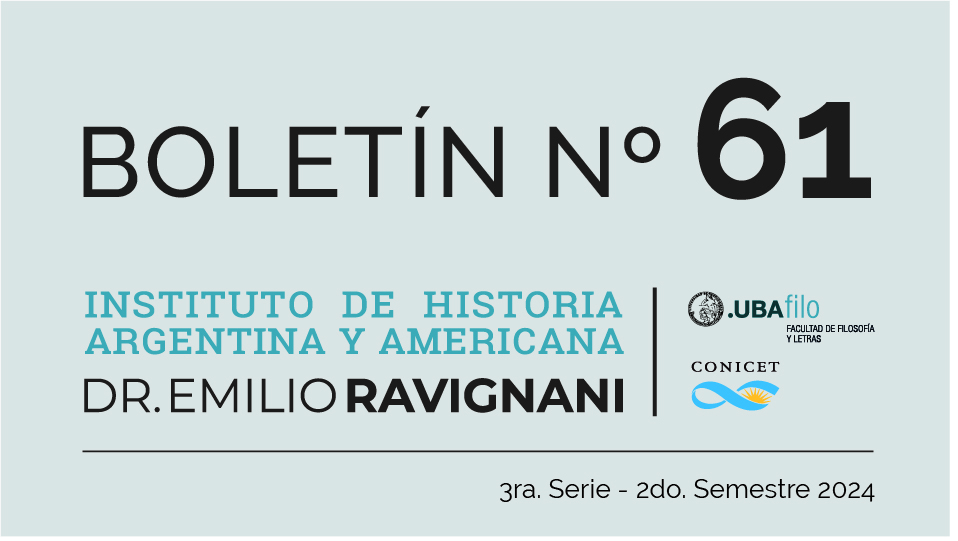Commentary on El país indiviso by Roxana Boixadós and Judith Farberman
Abstract
The following contribution offers an analysis of the book El país indiviso. Poblamiento, conflictos por la tierra y mestizajes en Los Llanos de La Rioja durante la Colonia, published in 2021, by Roxana Boixadós and Judith Farberman, which presents a study on the configuration of the Los Llanos de La Rioja region during the Colony and an analysis of the geographical and social dynamics around land conflicts.Downloads
References
Aguirrezabala, M. (2021). “Mujer de Negocios” en la colonia. Trama de la presencia femenina en el espacio mercantil rioplatense. Bahía Blanca: Editorial de la Universidad del Sur.
Barriera, D. (2019). Historia y Justicia: Cultura, política y sociedad en el Río de la Plata (Siglos XVI-XIX). Buenos Aires: Prometeo.
Baschet, J. (2009). La civilización feudal. Europa del año mil a la colonización de América. México: FCE.
Becker, A. (2017). Gender in the history of early modern political thought. The Historical Journal, 60(4), pp. 843-863.
Bixio, B. (2001). Los espacios de la exclusión en Córdoba del Tucumán. Anuario Centro de Estudios Históricos “prof. C. S. A. Segretti”, año 1, n. 1.
Brunner, O. (1976). La casa grande y la “oeconomica” de la Vieja Europa. En O. Brunner, Nuevos caminos de la historia social y constitucional. Buenos Aires: Alfa.
Cacciavillani, P. A. y Farberman, J. (2019). Del campo común al condominio y del condominio a la propiedad individual. Normativas y prácticas en Santiago del Estero (Argentina), 1850-1920. Revista Historia y Justicia, p. 1-27.
Cacciavillani, P. (2021). Celebrar lo imposible. El código civil en el régimen jurídico de la propiedad: Córdoba entre fines del siglo XIX y comienzos del XX. Frankfurt am Main: Global Perspectives on Legal History 18, Max Planck Institute for Legal History and Legal Theory.
Chevalier, F. (1999). La formación de los latifundios en México. Actualización de la obra. México: FCE.
Clavero, B. (1990). Antidora. Antropología católica de la economía moderna. Milán: Giuffrè.
Clavero, B. (2005). Freedom’s law and indigenous rights: From Europe’s Oeconomy to the constitutionalism of the Americas. The Robbins Collection: California.
Cuena Boy, F. (2006). Yanaconazgo y derecho romano: ¿una conjunción extravagante? Revista de Estudios Histórico-Jurídicos, XXVIII, pp. 401-424.
Dubber, M. (2005). The Police Power: Patriarchy and the Foundations of American Government. Columbia: Columbia University Press.
Graubart, K. (2007). With Our Labor and Sweat. Indigenous Women and the Formation of Colonial Society in Peru, 1550-1700. Stanford: Stanford University Press.
Imizcoz Beúnza, J. M. y Oliveri Korta, O. (2010). Economía doméstica y redes sociales en el Antiguo Régimen. Madrid: Sílex.
Lemperiere, A. (2004). Entre Dieu et le Roy, la Republique. Mexico, XVI-XVIII siècle. París: Les belles lettres.
López de Albornoz, C. (1998). Pueblos indios de Colalao y Tolombón: identidad colectiva y articulación étnica y social (siglos XVII-XIX). Humanitas, Revista de FFyL, pp. 71- 112.
López de Albornoz, C. (2003). Los dueños de la tierra. Economía, sociedad y poder en Tucumán (1770- 1820). Tucumán: UNT.
López, C. del C. (2015). Derechos de propiedad en el Tucumán colonial: fragmentación e indivisión de las tierras rurales. http://hdl.handle.net/11336/61141
Lorandi, A. M. (1988). El servicio personal como agente de desestructuración en el Tucumán colonial. Revista Andina, 6(1), pp. 135-173.
Luna, P. y Niccolo Mignemi, N. (Eds.) (2017). Prédateurs et résistants : appropriation et réappropriation de la terre et des ressources naturelles (16e-20e siècles). París: Éditions Syllepse.
Matienzo, J. de (1967). Gobierno de Perú. Paris-Lima: Travaux de l'Institut Francais d'Etudes Andines, tomo XI.
Noli, E. (2012). Indios ladinos, criollos aindiados. Procesos de mestizaje y memoria étnica en Tucumán (Siglo XVII). Prohistoria: Rosario.
Nuzzo, L. (2004). Il linguaggio giuridico della conquista: strategie di controllo nelle Indie spagnole. Strategie di controllo nelle Indie spagnole. Napoli: Jovene.
Rubio Durán, F. (1997). Tierra y ocupación en el área surandina. Colección La Otra América. Sevilla: Aconcagua.
Stern, S. (1982). Los pueblos indígenas. del Perú y el desafío de la conquista española. Huamanga hasta 1640. Madrid: Alianza Editorial.
Tau Anzoátegui, V. (2015). Provincial and Local Law of the Indies. A Research Program. En Duve, T. y Pihlajamäki, H. (Eds.), New Horizons in Spanish Colonial Law. Contributions to Transnational Early Modern Legal History. Global Perspectives on Legal History, Max Planck Institute for European Legal History Open Access Publication, Frankfurt am Main. https://www.lhlt.mpg.de/publications/gplh-3
Tau Anzoátegui, V. (2004). Los Bandos de Buen Gobierno del Río de la Plata, Tucumán y Cuyo (época hispánica). Buenos Aires: INHIDE.
Vallejo, J. (1992). Ruda equidad, ley consumada. Concepción de la potestad normativa (1250-1350). Madrid: Centro de Estudios Políticos y Constitucionales.
Zamora, R. (en prensa). Domestic spheres. En T. Duve y T. Herzog (Eds.), Cambridge Latin American history of lay in global perspectives. Cambridge: Cambridge University Press.
Zamora, R. (2017). Un espacio local para el fenómeno jurídico. Tempranas encomiendas y trabajo indígena en el Tucumán. En T. Duve (Coord.), Actas del XIX congreso del Instituto Internacional de Historia de Derecho Indiano. Berlín: Dykinson.
Zamora, R. (2017). Casa poblada y buen gobierno. Oeconomia católica y servicio personal en S.M. Tuc., siglo XVIII. Buenos Aires: Prometeo.
Zavala, S. (1979-1980). El servicio personal de los indios en el Perú. 3 tomos. México: El colegio de México.
Copyright (c) 2024 Boletín del Instituto de Historia Argentina y Americana Dr. Emilio Ravignani

This work is licensed under a Creative Commons Attribution-NonCommercial 4.0 International License.
The copyright is transferred to the Boletín, but the authors may retrieve them and reproduce their work in other media or formats by means of a written request to the Editorial Committee. In such cases, the Boletín will be cited as the first publication of the work.
The works are licensed under a Creative Commons Attribution-NonCommercial 4.0 International License, which allows others to share the work with an acknowledgment of their authorship and initial publication in this journal.
Also, by written request to the Editorial Committee of the Boletín, the authors may separately establish additional agreements for the non-exclusive distribution of the version of the work published in this journal (for example, placing it in an institutional repository or publishing it in a book), with an acknowledgement of its initial publication here. No commercial uses are allowed.



















